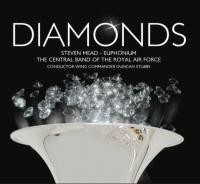
Steven Mead - Euphonium
The Central Band of the Royal Air Force
Conductor: Wing Commander Duncan Stubbs
BOCC120
Repetoire
1. Diamond Concerto ( Euphonium Concerto No. 3) ... Philip Sparke
2. Bliss ( Concertino for Euphonium) ... Hermann Pallhuber
3. Euphonium Concerto ... Stephen Roberts
4. Concerto for Euphonium, Winds and Percussion ( Summer of 2008) ... David Gillingham
5. Panache ... Robin Dewhurst
Additional Info
This is a recording project I have been dreaming about for a few years. I have for many years had profound admiration for the professionalism and musicianship of The Central Band of the Royal Air Force, and for the last 5 years or so I have also been visiting their base, at Uxbridge and now more recently are their brand-new headquarters in Northolt, working with their euphonium players.
About a year ago we began to plan this recording and as we did it became clear that I was going to be able to program four wonderful new concerti, two of which were composed for me. I had got to know Hermann Pallhuber through his superb large scale works for brass band and after a meeting in Tyrol where I gave a class on the euphonium to a conductors association that he organises. The idea of a concertino for euphonium and wind orchestra was born. About 8 or 9 months later Bliss was completed and the first performance was given in Innsbruck, with the composer present. It is a joyous celebration and would have been the title of this disc, until Philip Sparke composed this sensational Diamond Concerto. I had some discussions with a wind orchestra in Ida Oberstein, near Frankfurt about a celebration concert in 2012 and they were suggesting the idea of commissioning a composer to produce a new work. I proposed that we ask Philip, whose writing for the euphonium has been quite simply out of this world, since his early Fantasy for Euphonium up to the more recent Harlequin and other popular works, as well as his immense writing for the euphonium in his brass band works. Philip immediately agreed to the commission. For me it is such a privilege to be able to play this work and now record it with such a fine band. Undoubtedly it is one of the highlights of my musical career. The premiere was a big success and Philip was in Mörschied to hear his Euphonium Concerto No.3 and receive the thanks and adulation from the German musicians and audience.
I knew Stephen Roberts was writing and arranging and I have played some of his lighter arrangements over the years but was taken aback by his superb new Euphonium Concerto he sent me about six months ago. Not only the scale of the work, but its complexity and invention was a revelation. It is very hard to play but has such rich musical ideas and is scored so well for band I decided it must be on this CD. I hope you enjoy it. Stephen Roberts came to Northolt for the rehearsals and the recording session itself and was able to pass on some really helpful suggestions to us all.
The Concerto by David Gillingham is also new, first performed by Jason Ham and the West Point Band in the USA, and now being widely played by talented young euphonium players as it was selected (by me !) as the final work for the Euphonium Artist solo competition
at the forthcoming ITEC2012 in Linz. The scoring for band is immense, so varied and such wonderful use of colour, and the euphonium part is again so idiomatic and demands so much from the soloist, especially in the soaring second movement. The whole work is an aural treat and Gillingham should be congratulated for producing such a great new work for the euphonium's increasingly impressive solo repertoire. Recording these four major solo works in two days was indeed a challenge but thanks to the professionalism and concentration of the band
and their conductor Duncan Stubbs, recording engineer Richard Scott, and my strong lips (!) we completed it on schedule, with time also to record Robin Dewhurst's attractive Panache which rounds off this disc.
It is for me a celebration of the euphonium, an instrument that I feel privileged to be able to travel the world with and play every week for people, who fall in love with the sound.
Diamonds was released on Saturday, June 23,2012
CD Review by Kenneth Crookston, in the British Bandsman Magazine, 21st July 2012:
DIAMONDS
Steven Mead (euphonium) Central Band of the Royal Air Force, conductor Wing Commander Duncan Stubbs Bocchino Music: CD BOCC120
As a leading exponent and proponent of the euphonium and its music, Steven Mead requires no introduction to the readers of this magazine. He has been responsible for the commissioning of a vast amount of new music, and his recording output over the past two decades is as rich in quality as in number. To attempt to quantify the number of awards both his playing and recordings have acquired would take more space than we have here. By continually presenting something new, he always gives the listener a reason to buy his recordings, and this one, featuring three concerti, a concertino and a short but attractive extra, is no exception.
The opening piece, Philip Sparke’s Diamond Concerto, his third concerto for euphonium, finds both soloist and band performing with apparent ease, despite the fiendishly difficult nature of some of the music. Earth Star, the opening movement, is characteristic of the composer’s style, with the soloist developing the material from the opening ‘free fantasy’. Movement two, Ocean Dream, will ring a bell with anyone who has heard Music for Battle Creek, as it uses the extended euphonium solo from the 2007 National Championship test- piece as its central theme. This doesn’t seem out of place at all, but perhaps the fact that it was originally composed with the same soloist in mind has something to do with this. In Blue Heart, the lively final section, band and soloist are pushed to the limits in a jazz waltz, with an improvised call and response passage that calls upon what could best be described in these Olympian times as musical athleticism. Fantastic stuff!
The opening of Hermann Pallhuber’s Bliss is an altogether more sedate affair, introducing us to one of the themes in the second section of this accessible concertino. There more musical gymnastics across the full range of the euphonium in the second part, which also features a melodic section reminiscent of Puccini’s Nessun Dorma. Altogether, it is a very enjoyable and accessible work that one suspects will likely appear in the concerts and recitals of a number of today’s outstanding euphoniumists.
Stephen Roberts wrote his Concerto for Euphonium in 2011, inspired by euphonium performances heard recently during conservatoire examinations around the
UK. Remarkably, the challenging opening movement’s themes are based on blackbird calls heard in the composer’s garden (what tuneful birds they must have in Birmingham!). The high-set second movement tests the soloist in other ways, but the controlled lyricism of Steven
Mead’s playing is applied to perfection. The complex Latin finale features alternating double and triple measures, with technical flexibility high on the agenda, although band and soloist appear to handle it all with ease.
David Gillingham’s Concerto for Euphonium, Winds and Percussion, subtitled Summer of 2008 (although why is left to the imagination of the listener) follows on from his well-known euphonium work, Vintage, which the prominent wind band composer wrote at the end of the last century. Changing Weather is the descriptive title of the animated first movement, built
upon a four-note motif, and the listener really is left with a feeling of movement and change with the various arpeggios leading to soaring melodies. In Wondrous Starry Night the soloist spends much of the time providing decoration for the melody played by the accompanying band, but what melodic passages he has are both high and extended - a real test of stamina and flexibility, only to be taken on by the most daring of performers. A piece without a safety net!
There are shades of Shostakovich in the final
movement, Festivals – a lively rondo – the style of which is perfectly in keeping with this most attractive of works.
Finally, a lovely piece of light music writing from the now-familiar pen of Robin Dewhurst, but written 18 years ago - Panache. It’s everything its title sets it out to be and a fitting end to yet another terrific CD recording from a soloist, who recently entered his sixth decade but is showing no signs of wear and tear in his level of performance and attention to musical detail.
It would be remiss not to give a special mention to the Central Band of the Royal Air Force, under the direction of Duncan Stubbs, which had clearly prepared meticulously for this recording and makes an outstanding contribution to a product that is well-balanced both in musical content and aural reproduction. All students
of the euphonium, solo playing and the art of tasteful accompaniment should add it to their Christmas wish-list!
Kenneth Crookston

